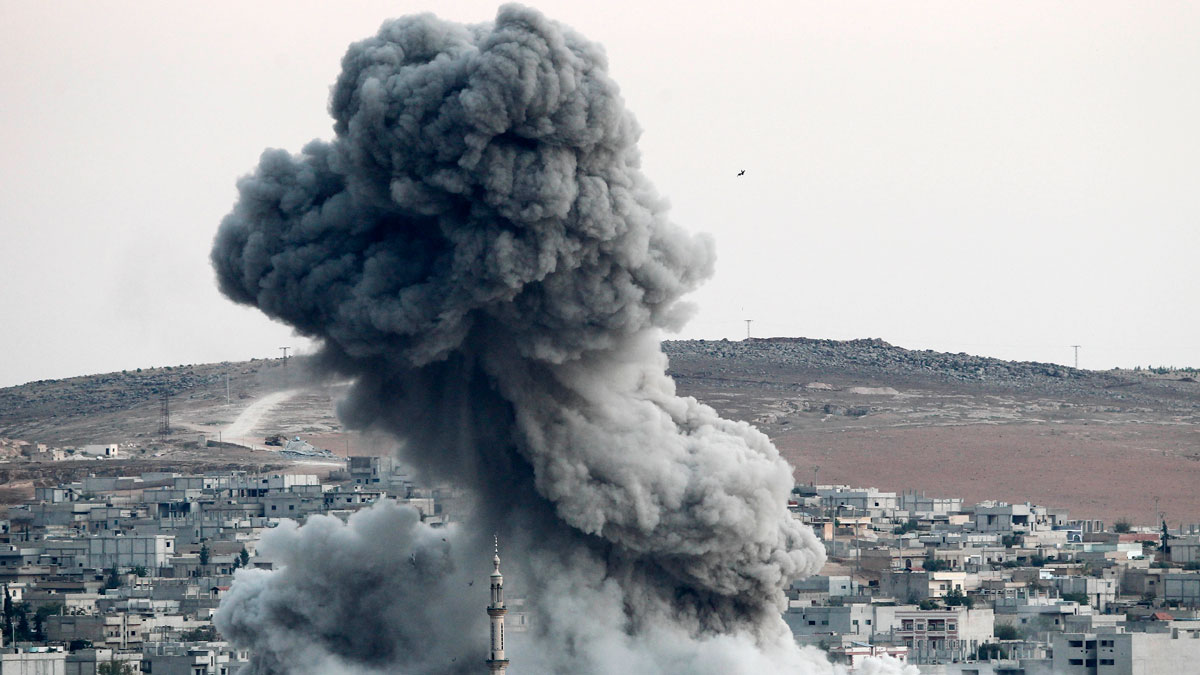Israeli rockets ‘hit Syrian chemical weapons factory’
West suspects military site is used for manufacture of illegal arms

A free daily email with the biggest news stories of the day – and the best features from TheWeek.com
You are now subscribed
Your newsletter sign-up was successful
Israel has carried out an air strike on a Syrian military facility that Western powers suspect is used to manufacture chemical weapons.
Israel – as is its custom – has not commented on the strike in the early hours today, at Masyaf, near the city of Hama. The Syrian army released a statement saying two soldiers had been killed when several missiles fired from within Lebanese air space hit the facility, which it described as a military base.
The statement warned of the “dangerous repercussions of this aggressive action to the security and stability of the region”. According to Al Jazeera, local media in Lebanon reported sightings of Israeli jets breaching Lebanese air space at the time of the attack.
The Week
Escape your echo chamber. Get the facts behind the news, plus analysis from multiple perspectives.

Sign up for The Week's Free Newsletters
From our morning news briefing to a weekly Good News Newsletter, get the best of The Week delivered directly to your inbox.
From our morning news briefing to a weekly Good News Newsletter, get the best of The Week delivered directly to your inbox.
The Syrian Observatory for Human Rights, based in the UK, said the rockets had hit a military camp used to store missiles and an adjacent Scientific Studies and Research Centre facility.
Syrian leader Bashar al-Assad is meant to have destroyed all chemical weapons under a deal agreed with the international community in 2013.
However, according to a UN report published yesterday, at least 20 suspected chemical attacks have been carried out by his forces since then. The report said the Syrian Air Force had used the nerve agent Sarin in one attack, on the rebel town of Khan Sheikhoun in April.
That attack prompted US President Donald Trump to order cruise missile strikes on a Syrian air base.
A free daily email with the biggest news stories of the day – and the best features from TheWeek.com
The BBC’s Jonathan Marcus says today’s air strike bears a clear message from Israel: it will not tolerate the alleged military presence of Iran and Hezbollah in Syria. Israel claims that Iran is building missiles in Syria and Lebanon for the Islamist militant group.
The Times of Israel quotes former Israeli intelligence chief Amos Yadlin as saying that Israel was also showing the world it would enforce its “red lines” despite other countries “ignoring them,” and even though “the presence of Russian air defence does not prevent air strikes attributed to Israel”.
-
 What to watch out for at the Winter Olympics
What to watch out for at the Winter OlympicsThe Explainer Family dynasties, Ice agents and unlikely heroes are expected at the tournament
-
 Properties of the week: houses near spectacular coastal walks
Properties of the week: houses near spectacular coastal walksThe Week Recommends Featuring homes in Cornwall, Devon and Northumberland
-
 Will Beatrice and Eugenie be dragged into the Epstein scandal?
Will Beatrice and Eugenie be dragged into the Epstein scandal?Talking Point The latest slew of embarrassing emails from Fergie to the notorious sex offender have put her daughters in a deeply uncomfortable position
-
 Epstein files topple law CEO, roil UK government
Epstein files topple law CEO, roil UK governmentSpeed Read Peter Mandelson, Britain’s former ambassador to the US, is caught up in the scandal
-
 Iran and US prepare to meet after skirmishes
Iran and US prepare to meet after skirmishesSpeed Read The incident comes amid heightened tensions in the Middle East
-
 Syria’s Kurds: abandoned by their US ally
Syria’s Kurds: abandoned by their US allyTalking Point Ahmed al-Sharaa’s lightning offensive against Syrian Kurdistan belies his promise to respect the country’s ethnic minorities
-
 Israel retrieves final hostage’s body from Gaza
Israel retrieves final hostage’s body from GazaSpeed Read The 24-year-old police officer was killed during the initial Hamas attack
-
 China’s Xi targets top general in growing purge
China’s Xi targets top general in growing purgeSpeed Read Zhang Youxia is being investigated over ‘grave violations’ of the law
-
 Syria’s Islamic State problem
Syria’s Islamic State problemIn The Spotlight Fragile security in prison camps leads to escape of IS fighters
-
 Panama and Canada are negotiating over a crucial copper mine
Panama and Canada are negotiating over a crucial copper mineIn the Spotlight Panama is set to make a final decision on the mine this summer
-
 Why Greenland’s natural resources are nearly impossible to mine
Why Greenland’s natural resources are nearly impossible to mineThe Explainer The country’s natural landscape makes the task extremely difficult